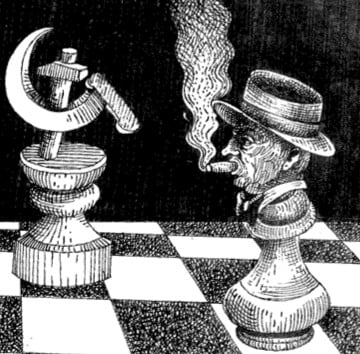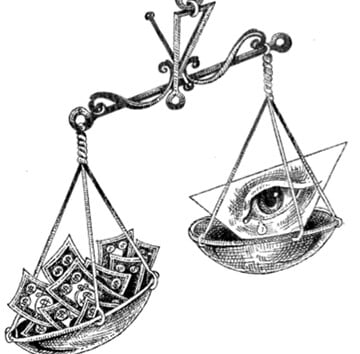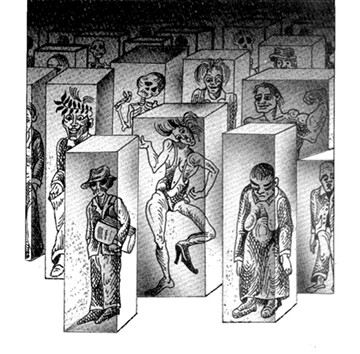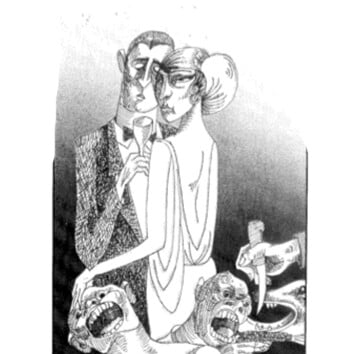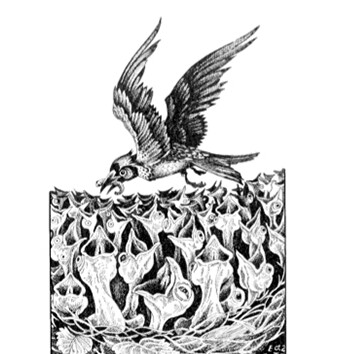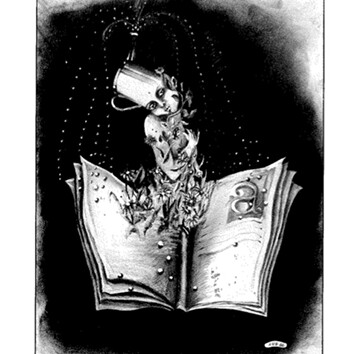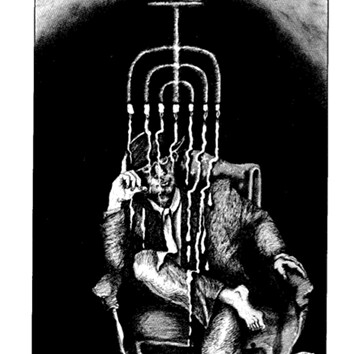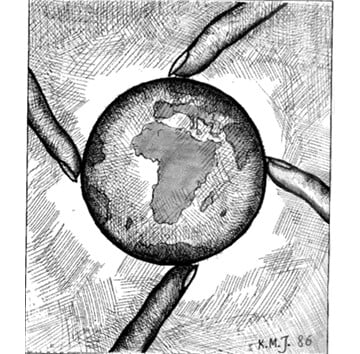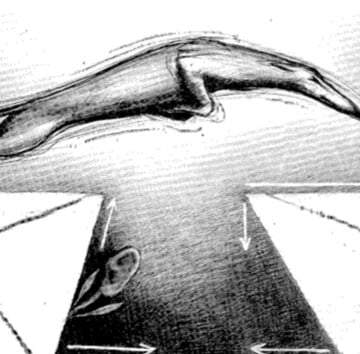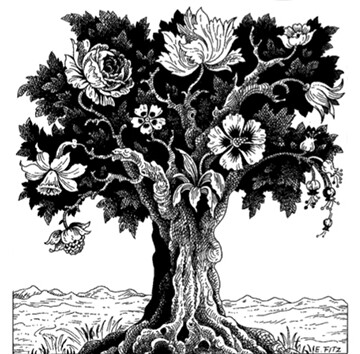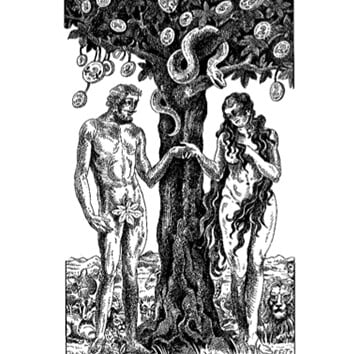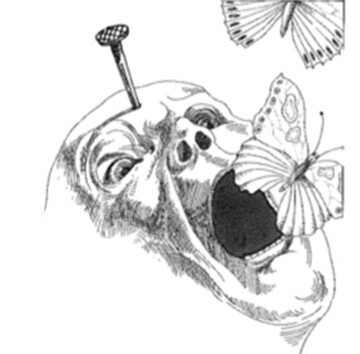George Nash, the historian of post-World War II American conservatism, in a recent speech at Hillsdale College in Michigan called for a conservatism which would attempt to change the world as well as to understand it—a conservatism of politics as well as of scholarship. Conservatism, Nash declared, “must succeed in the arena of polities, not...
Category: Reviews
Back to Barbarism
Much of the bioregional vision should appeal to conservative sentiments. As the pitiful remnant of America’s agrarian culture again falls victim to drought and depression, the bioregionalists call for a return to the land, a reconstruction of self-sufficient farm life, and a reverence toward the soil as the organic bond of human generations. As Ortega...
Entrepreneurs and Bureaucrats
Despite his Viennese birth, Peter Drucker enjoys a reputation as a leading American social analyst, particularly on industrial and economic issues. In Innovation and Entrepreneurship, Drucker interprets U.S. management theory and practice within the framework of the free market economy and the open society, as he seeks to define entrepreneurship as “a craft” essential for...
The Right Kind of Spy
In these two recent spy thrillers, William F. Buckley’s CIA-trained alter ego makes his sixth and seventh appearances in a decade to play a winning hand in the high-stakes intrigue surrounding crucial moments in the Cold War. On a secret mission to Cuba (Project Alligator) aimed at exploring with Che Guevara possibilities for easing tensions...
An Executive Fights Back
During the well-publicized oil crisis of the I970’s, populists looking for an easy answer to the problem of excruciatingly long lines at gas stations reflexively blamed the big oil companies. These barons of black gold were accused of bilking the public. So widespread was this sentiment that President Carter himself joined the chorus of blame....
The Bureaucrat and the Shoe Salesman
“Among the many priests of Jove . . . all passed muster that could hide Their sloth, avarice, and pride.” —Bernard Mandeville Bruno Rizzi’s La Bureaucratisation du Monde, first published in Paris in 1939 and Part I of which is here translated by Adam Westoby into English for the first time, is the obscure work...
More Money Than God
“How shameless and how greedy all these people are!” —Fyodor Dostoevsky Once there were three finance firms and then there were none. One was a Ponzi scheme, one a tax fraud, and the last was sold to American Express for $380 million. One CEO is broke and in jail; one is a wealthy fugitive from...
A Touch of Class
“The market may have its martyrdoms as well as the pulpit; and trade its heroisms, as well as war.” —John Ruskin We were two old parties, my visiting brother and I, sitting under the grape arbor at the end of a mild summer day. When I say “two old parties,” however, in the manner of...
Betrayed by Britain
“And hung my head and wept at Britain’s name.” —Samuel Taylor Coleridge If there be monsters, they yawn from within. It is hard not to see justice in the story of an empire, brought low by its unwillingness to defend itself. “This book is in part a penance for unquestioningly accepting the Titoist bias shared...
A Spymaster Defects
As a member of the last generation of English middle-class boys brought up on great expectations of prosperity, glamour, and power, John Le Carré first became famous in America when his obsession with the failed promise of his own society supplied an analogy for American middle-class readers jaded by the extravagant claims being made for...
Sons of Jacob
“I pray you think you question with the Jew.” —William Shakespeare, The Merchant of Venice The Jews Under Roman and Byzantine Rule has already appeared in German and Hebrew editions by the same polyglot author who has now produced the English translation. Avi-Yonah has mined Greek, Hebrew, and Latin sources and puts into his footnotes...
Clipping the Angel’s Wings
” . . . Words strain, Crack and sometimes break. . . . “ —T.S. Eliot The ancients, wiser than modem theorists, recognized language as a gift and (at Babel) a curse from the heavens. Even pagans recognized a Word behind words and a Muse beyond music. The Creator of the world was everywhere acknowledged...
Dialogue of Self and Soul
Years ago, I was a different person. I looked different, thought differently, acted differently. And yet I am also the same person; there is no doubt in my mind that the “I” of, say, 10 years ago is fundamentally the same person as the one now writing this review. Evidently “I” cannot be identified neatly...
Second Adam
Most persons now living can expect to witness the turning from the second to the third millennium of the Christian era. The year 2000 anno Domini looms as a seeming tower in time, commanding our attentive awe as we approach it. But in our age there is something oddly jarring about “the year of our...
Castro’s Heart of Darkness
Communist governments arrest and imprison citizens who express opinions at variance with official orthodoxies. There is hardly an educated American or European who doesn’t know that much. They are also aware that these citizens suffer torture and abuse for many years in those prisons. But it takes more than knowledge to appreciate what goes on...
The Future of Private Language
John Ashbery is a familiar name to readers of contemporary American poetry and art criticism. He is, one might say, the poetry establishment and the art establishment woven into one. He has won all the honors, including a lucrative MacArthur Fellowship (which came to him, predictably, after it might have been needed). With this background,...
More Than Funny Pictures
Collections of previously published cartoons are usually greeted among “serious” readers by a dignified silence signifying anything from contempt to indifference. These may be the same cartoons which those same cognoscenti pore over and roar over in The New Yorker. “The Men Will Fear You, and the Women Will Adore You” by cartoonist William Hamilton...
Misprints and Misprision
“The sin against the spirit of a work always begins with a sin against the letter.” —Igor Stravinsky “When I hear the word ‘theory,’ I loosen the safety latch on my revolver,” remarked one disgruntled language teacher recently. He had an excuse, after all. He had just listened to an hour-long exposition of a Lacanian...
Bad, Bad Boy
“Big Jim” Folsom (1908- ), governor of Alabama (1946-1950, 1954-1958), was said to have entered office on a collision course with the state’s two major economic estates, big business and big agriculture. The 20-county Black Belt (a name derived from its soil, but equally descriptive of population composition) traverses the state just south of center....
Ski Poles and Baby Doctors
As essayists go, John McPhee has be come something of a celebrity. He has been praised in places as diverse as National Review and National Public Radio; he has written 18 books and no telling how many articles; moreover, he is said to be the best thing The New Yorker, in its decrepitude, has going...
Wild Parlor Games
“There are bad people who would be less dangerous if they had no good in them.” —La Rochefoucauld From the beginning of his literary career, Robert Coover has been driven by the quite commendable ambition to make radical innovations in the forms and styles of contemporary fiction. Like John Barth, who once famously proclaimed the...
Postrevolution Blues
The situation is familiar to any student of socialist revolutions: The revolution is over, and the political apparatus has become authoritarian and alienated from its popular base. The lives of real people become less important than the economic programs and ideological causes of a growing bureaucracy. Then come suspicion, repression, overzealous police vigilance, persecution of...
Russia by Numbers
USSR Facts & Figures Annual is an excellent source of current statistical and factual information on the Soviet Union. Since 1977, Academic International Press has published an annual volume for anyone who needs to keep up to date on developments in the Soviet Union. The updated as well as new information covers such topics as...
Voice From the Brier Patch
“One night,” said Uncle Remus—taking Miss Sally’s little boy on his knee, and stroking the child’s hair thoughtfully and caressingly—”one night Brer Possum call by fer Brer Coon, cordin ter greement, an atter gobblin up a dish er fried greens en smokin’ a seegyar, dey rambled fort fer ter see how de balance er de settlement...
Pulling the Plugs
“Culture looks beyond machinery.” —Matthew Arnold A generation ago, the strongest voice raised against materialism, scientism, and the depredations of technology and mass communication was that of rhetorician and second generation agrarian Richard Weaver. In books like Ideas Have Consequences and Visions of Order, Weaver combines a disdain for technological culture in general with grave...
Unconstitutional
“Can the liberties of a nation be thought secure, when we have removed their only firm basis, a conviction in the minds of the people that these liberties are the gift of God?” —Thomas Jefferson Not long ago Time magazine celebrated America with a special issue. Among the ornaments of this production was an essay...
Still, Sad Music
“A poet in our times is a semi- barbarian in a civilized community.” —Thomas Love Peacock Something happened. The juice went out of it, the largest joy. There may arise figures analogous to Emily Dickinson, or even to John Clare, but no experienced lover of poetry expects a new Keats or a new Shelley or...
Remembering Roswitha
Do you remember Hrotsvit (Roswitha) of Gandersheim, mentioned in the survey of world literature that you took as an undergraduate? “The first female German poet, the first dramatist of Germany, the first person in Germany to employ the Faust theme, etc.”—but who cared? Because Hrotsvit, the canoness of the Imperial Abbey of Gandersheim, wrote her...
Off Center On Target
“I should have availed myself of waggery, had not malice been multitudinous.” —Christopher Smart The English are known for their love of the eccentric. Batty dons, hapless clerics, Colonel Blimps, imperious aunts, and addled aristocrats are scattered over the landscape of the English popular imagination. In a society where a high value is placed on...
Amazing Grace
In the New College at Edinburgh in 1934, young divinity students stimulated themselves by turning over old and new ideas: Calvinism, Barthianism, the role of the body of Christ in the world, the form of the liturgy, the purpose of missions—in other words, the same issues that, mutatis mutandis, have sparked theological discussions since the...
Decent Folk From Georgia
“Livin’ is like pourin’ water out of a tumbler into a dang Coca-Cola bottle. If’n you skeered you cain’t do it, you cain’t. If’n you say to yoreself, ‘By dang, I can do it!’ then, by dang, you won’t slosh a drop.” This sample of dialogue conveys something of the tone, language, and philosophy of...
Barroom Psychiatry
Psychotherapy is big business. America employs perhaps a half million professionals and paraprofessionals (psycho therapists, psychiatric technicians, drug/alcohol counselors, clinical social workers, clinical psychologists, psychiatrists and psychiatric nurses, family therapists) in the field, and the talk therapy industry as a whole is worth about $17 billion. Yet many scholars and laymen are uneasy at the...
When He Was Good
“A man who writes a book, thinks himself wiser or wittier than the rest of mankind; he supposes that he can instruct or amuse them, and the public to whom he appeals must, after all, be the fudges of his pretensions.” —Samuel Johnson Philip Roth’s first book, a collection of stories called Goodbye Columbus, was...
Sorcery in the Kremlin
Some novels tell a story that causes us to see reality in a new way. Other novels are manufactured around a message. The Set-Up is of this second type. Volkoff wants to teach us that the Soviets plan long term, that they are clever at masking their intentions, and that they have committed their re...
The Mafioso
According to some theorists, most of America’s woes began with the arrival of big government in 1932. Before that time, so the story goes, liberty was the rule, the work ethic was alive and well, God was in the classroom, and all was well with the world. As with all ideologies, this one presents an...
Rendering Unto Caesar
“Parnell came down the road, he said to a cheering man: ‘Ireland shall get her beedom and you shall break stone.'” —W. Yeats That some Protestant theologians meshed Christianity with Nazism and became ardent supporters of Hider should surprise no one familiar with the activities of theologians who support a Marxist-Leninism dedicated to destruction of...
The War Against the West
“Better fifty years of Europe than a cycle of Cathay.” —Tennyson In our day the mere mention of imperialism is enough to provoke paroxysms of moral outrage. Except in derision, no one any longer dares to speak of the white man’s burden, and few possess the courage to say that it was Europeans who created...
The Celts of the West
The ancient story of early Scotland will not be fully told until much more study has been completed, The face of the land literally is pockmarked with the remains of settlements and dwellings—many unexcavated—raised in an age so remote from our own, we scarcely know the names of the races that inhabited them. Riddles there...
Epigones of the Lost Generation
Near the end of this fine book, John Aldridge observes: “The history of the period from 1890, roughly, to 1940 might . . . have been the history of the disappearance of the novel as an art form in society. . . . Yet there has seldom if ever been a time when more novels...
Germania Tremens
“What wonders I have done, all Germany can witness. . . . “ —Christopher Marlowe Anyone who has lived in Germany eventually realizes that Germany is a nation of hypochondriacs. Germans spend far more than Americans on nostrums, vitamins, tranquilizers, and elixers; Americans may watch “Dynasty,” but the most popular TV show in the Federal...
Letters From Tocqueville
“I am rich in letters. . . . “ —Horace Walpole Alexis de Tocqueville was an immensely prolific writer. His friend Gustave de Beaumont wrote that “for one volume he published he wrote ten; and the notes he cast aside as intended only for himself would have served many writers as text for the printer.”...
Telling Stories Out of School
It was E.G. Wodehouse, I think, who once told an anxious would-be writer of fiction that literary success was the result of careful adherence to a few very simple rules. Find a desk, Wodehouse suggested, and stock its drawers with sharp pencils and plenty of paper. Pull up a chair. Then, “Put your bum on...
Journalists and Other Turncoats
America’s journalists enjoyed their finest hour during Vietnam—indulging in reporting that overwhelmed all objective presentation of American military action. A recent book about Robert Garwood by two former reporters for the Washington Star suggests that our newspapermen are not done yet. Marine Private First Class Robert Garwood, captured by the Vietcong in 1963 and released...
Going Back to Charleston
The United States were once precisely that, a union of unique and independent states—each making its own literary and intellectual contribution to the national experience. Of these states, none was so peculiar as South Carolina, and for much of its intellectual history, South Carolina was Charleston. In the generation before The War, Charleston was in...
Madman in the Dock
When John Hinckley was acquitted in 1982 for his attempted assassination of the President, the verdict galvanized opposition to the insanity defense. Some lawmakers wanted to restrict the use of the defense or even abolish it altogether. In Crime and Madness Thomas Maeder places the insanity defense and the recent challenges to it in historical...
Bashing the Baptists
“Who are these people?” someone asks about evangelicals in the early pages of Redemptorama, a book billed as an exploration of Christ and contemporary culture. Despite years of research and her own Southern Baptist upbringing, the author, Carol Flake, offers only caricatures in response to the question. The book is supposed to help sophisticates bewildered...
Faith and Empathy
“Well, I do believe some things, of course . . . and therefore, of course, I don’t believe other things.” —G.K. Chesterton, The Incredulity of Father Brown The progressive turning away from belief in God that characterized Western intellectuals during the 19th century continues, alas, in the 20th. This intellectual shift has often been attributed...
Lame Hands of Socialist Faith
“You . . . have been borrowing goblins from the capitalist. . . . “ —John Ruskin For numerous well-known Western intellectuals, capitalism versus socialism remains the great dilemma, the principal philosophical and institutional alternative of our times. It is far from self-evident why this should be the case. Why not political pluralism as opposed...
Pleasant Words & Ugly Books
“Then shall I dare these real ills to hide In tinsel trappings of poetic pride?” —George Crabbe English must be kept up. It rarely is. But what a splendid collection of offenses against it is in D.J. Enright’s book of euphemism. Those who delight in the instructions for Japanese small appliances will here encounter the...
Not a Prayer
“(Portentous sight!) the owlet Atheism, Sailing on obscene wings athwart the noon . . . “ —Samuel Taylor Coleridge Individualism is the question of first concern to the future of the West. The dread argument of the individual case is, I think, the fundamental idea of modernism. Books like those by Turner and Bellah &...
